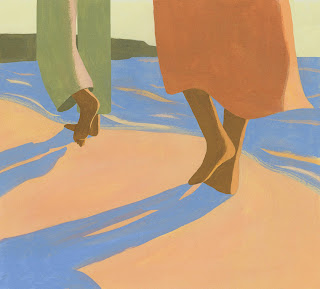''Fellowship Point'' by Alice Elliott Dark. 'Fellowship Point' is a novel rich with social and psychological insights, both earned and sly, big ideas grounded in individual emotions, a portrait of tightly knit community made up of artfully drawn, individual souls.
Novels featuring older characters are well suited to an exploration of questions about time, history and change. Unlike younger protagonists, they already know who they've become and what they've made of their lives.
They're not finished yet, but they are busy reckoning with the past as they're living in the present. They are in full possession of the bulk of their life's trajectory, so their primary aim is to resolve and make sense of things before they die.
The two women at the center of Alice Elliott Dark's enthralling, masterfully written new novel have been friends for about 80 years, since they were babies. Their long intertwined families, wealthy Philadelphian Quakers, own ''cottages'' on a Maine peninsula.
Fellowship Point is a pristinely preserved place where every year they find ''the same old lobster buoys and the boom of the ocean and the whistles in the treetops,'' and where ''the moss and ground cover yearned toward the spears of light, and the shadows were bubbles of cool.''
Agnes Lee, the novel's driving force, is a prickly, solitary, unmarried, childless vegetarian, as well as a famous children's book writer with a secret identity.
She's the pseudonymous author of a best-selling series of satirical novels in which she wickedly skewers her wealthy Philadelphian female cohort.
Agnes balks when Maud Silver, a 27-year-old editorial assistant, tries to spur her to write a memoir about the genesis of her children's books. But still, she finds herself unable to resist Maud's admiration, as well as her fierce intelligence, which turns out to be a match for Agnes's own.
Maud is an interesting foil for Agnes, and the resulting relationship between these two women, one old, one young, provides a secondary source of emotional fuel to ''Fellowship Points'' as well as a series of plot twists that [astonishingly] manage to tie everything together.
The novel's resolution - unexpected and yet, once we get there, satisfying and inevitable - is handled with such skill in its temporal layering, I had to tip my writerly hat over and over to Dark.
What first appears to be the story of two old ladies in Maine turns out to be a sophisticated inquiry into the course of female lives, with time as an instrument of revelation, folding on itself, opening out, revealing the multilayered histories of both Poly and Agnes as a means of showing a kind of existential truth :
''Nothing owes its existence to something. And something owes its existence to nothing.''
When Polly tells her husband this, early in the novel, he brushes it aside as too simple and intuitive to be taken seriously. His brusque dismissal is as telling as her excitement.
The World Students Society thanks review author Kate Christensen.

.png)


0 comments:
Post a Comment
Grace A Comment!